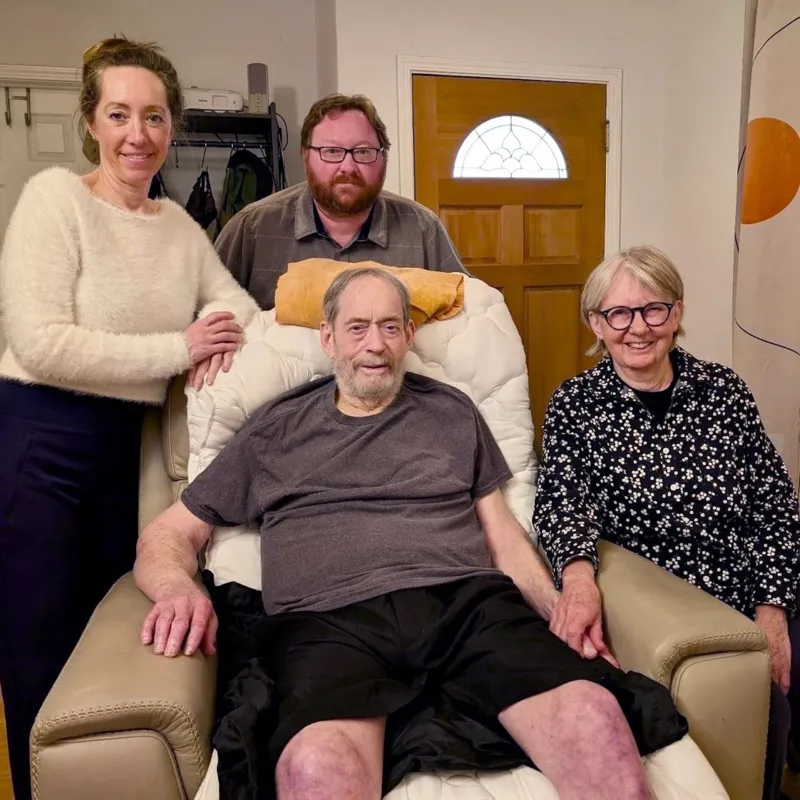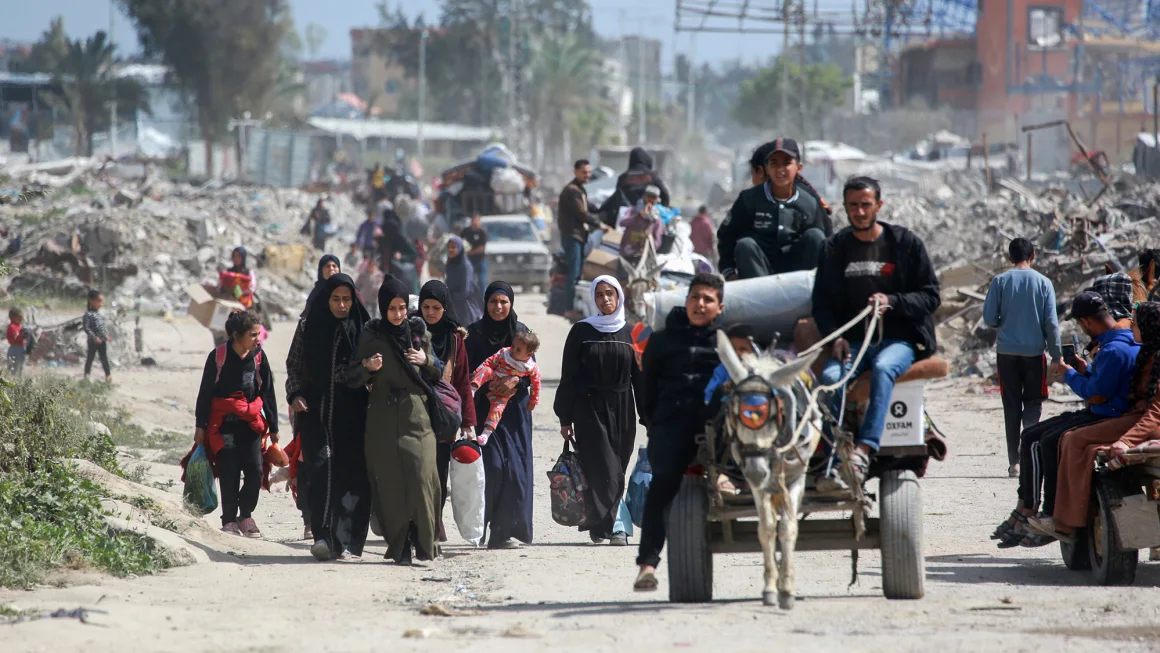Foreign
Hamas claims spokesperson killed in Israeli strike on northern Gaza

Earlier this week, Israel killed Ismail Barhoum, a member of Hamas’ political office, and Salah al-Bardaweel, another senior leader.

Hamas spokesman Abdel Latif al-Qanou was allegedly killed in an Israeli airstrike on northern Gaza, Hamas-affiliated news agency Shehab reported on Wednesday night.

Al-Qanoa was one of Hamas’s most prominent spokesmen in Gaza, and while he avoided media appearances during the months of fighting, he gave multiple interviews to Arab news channels after the ceasefire.
Al-Qanoua was killed when his tent was targeted in Jabaliya, the Hamas-run Al-Aqsa television reported. The same strike wounded several people, medical sources said.
Earlier this week, Israel killed Ismail Barhoum, a member of Hamas’ political office, and Salah al-Bardaweel, another senior leader.
Both Bardaweel and Barhoum were members of the 20-member Hamas decision-making body, the political office, 11 of whom have been killed since the start of the war in late 2023, according to Hamas sources.
Tents for Palestinians seeking refuge are set up on the grounds of a United Nations Relief and Works Agency for Palestine Refugees (UNRWA) centre in Khan Yunis in the southern Gaza Strip on October 19, 2023, amid the ongoing battles between Israel and the Palestinian group Hamas (credit: MAHMUD HAMS/AFP via Getty Images)
The IDF has yet to comment on the alleged elimination.
Increased IDF pressure in the Gaza Strip
Since fighting in Gaza was renewed at the beginning of last week, the IDF has killed 150 terrorists, including 10 top Hamas officials, The Jerusalem Post learned Tuesday.
In certain areas, the military has entered a full kilometer into Gaza, such as around the Nitzanim Corridor in central Gaza.
In addition to central Gaza, Beit Lahia, Beit Hanoun, parts of Khan Yunis, Shaboura, and Tel Sultan, the IDF has been evacuating and moving into Jabaliya.

Foreign
California man bids goodbye to family, invites BBC to witness his death as MPs debate assisted dying

It’s 10am, and in a little over two hours, Wayne Hawkins will be dead.

The sun is shining on the bungalow where the 80-year-old lives in San Diego, California with his wife of more than five decades, Stella.

I knock on the door and meet his children – Emily, 48, and Ashley, 44 – who have spent the last two weeks at their father’s side.
Wayne sits in a reclining chair where he spends most of his days. Terminally ill, he is too weak to leave the house.
He has invited BBC News to witness his death under California’s assisted dying laws – if MPs in London vote to legalise the practice in England and Wales, it will allow some terminally ill people here to die in a similar way.
Half an hour after arriving at Wayne’s house, I watch him swallow three anti-nausea tablets, designed to minimise the risk of him vomiting the lethal medication he plans to take shortly.
Are you sure this day is your last, I ask him? “I’m all in,” he replies. “I was determined and decided weeks ago – I’ve had no trepidation since then.”
His family ask for one last photo, which I take, and you can see at the top of this page. As usual, Stella and Wayne are holding hands.
Shortly after, Dr Donnie Moore arrives. He has got to know the family over the past few weeks, visiting them on several occasions alongside running his own end-of-life clinic. Under California law, he is what is known as the attending physician who must confirm, in addition to a second doctor, that Wayne is eligible for aid in dying.
Dr Moore’s role is part physician, part counsellor in this situation, one he has been in for 150 assisted deaths before.
On a top shelf in Wayne’s bedroom sits a brown glass bottle containing a fine white powder – a mixture of five drugs, sedatives and painkillers, delivered to the house four weeks before. The dosage of drugs inside is hundreds of times higher than those used in regular healthcare and is “guaranteed” to be fatal, Dr Moore explains. Unlike California, the proposed law at Westminster would require a doctor to bring any such medication with them.
Dr Donnie Moore has been involved in dozens of assisted deaths
When Wayne signals he is ready, the doctor mixes the meds with cherry and pineapple juice to soften the bitter taste – and he hands this pink liquid to Wayne.
No one, not even the doctor, knows how long it will take him to die after taking the lethal drugs. Dr Moore explains to me that, in his experience, death usually occurs between 30 minutes and two hours of ingestion, but on one occasion it took 17 hours.
This is the story of how and why Wayne chose to die. And why others have decided not to follow the same course.
We first met the couple a few weeks earlier, when Wayne explained why he was going ahead with the decision to have an assisted death – a controversial measure in other parts of the world.
“Some days the pain is almost more than I can handle,” he said. “I just don’t see any merit to dying slow and painfully, hooked up with stuff – intubation, feeding tubes,” he told me. “I want none of it.”
Wayne said he had watched two relatives die “miserable”, “heinous” deaths from heart failure.
“I hate hospitals, they are miserable. I will die in the street first.”
Wayne met Stella in 1969; the couple married four years later. He told us it was something of an arranged marriage, as his mother kept inviting Stella for dinner until eventually the penny dropped that he should take her out.
They lived for many years in Arcata, northern California, surrounded by sweeping forests of redwood trees, where Wayne worked as a landscape architect, while Stella was a primary school teacher. They spent their holidays hiking and camping with their children.
Now Wayne is terminally ill with heart failure, which has already brought him close to death. He has myriad other health issues including prostate cancer, liver failure and sepsis which brings him serious spinal pain.
He has less than six months to live, qualifying him for an assisted death in California. His request to die has been approved by two doctors and the lethal medication is self-administered.
It was during our first meeting that he asked the BBC to return to observe his final day, saying he wanted terminally ill adults in the UK to have the same right to an assisted death as him.
“Britain is pretty good with freedoms and this is just another one,” he said. “People should be able to choose the time of their death as long as they meet the rules like six months to live or less.”
Stella, 78, supports his decision. “I’ve known him for over 50 years. He’s a very independent man. He’s always known what he wants to do and he’s always fixed things. That’s how he’s operating now. If this is his choice, I definitely agree, and I’ve seen him really suffer with the illness he’s got. I don’t want that for him.”
Wayne would also qualify under the proposed new assisted dying law in England and Wales. The measures return to the House of Commons later this month, when all MPs will have a chance to debate and vote on changes to the Terminally Ill Adults (End of Life) Bill.
The proposed legislation, tabled by Labour MP Kim Leadbeater, says that anyone who wants to end their life must have the mental capacity to make the choice, that they must be expected to die within six months, and must make two separate declarations – witnessed and signed – about their wish to die. They must satisfy two independent doctors that they are eligible.
MPs in Westminster voted in favour of assisted dying in principle last November but remain bitterly divided on the issue. If they ultimately decide to approve the bill, it could become law within the next year and come into practice within the next four years.
A list of organisations in the UK offering support and information with some of the issues in this story is available at BBC Action Line
There are also divisions here in California, where assisted dying was introduced in 2016. Michelle and Mike Carter, both 72 and married for 43 years, are each being treated for cancer – Mike has prostate cancer that has spread to his lymph nodes, and Michelle’s advanced terminal ovarian cancer has spread throughout much of her body.
“I held my mother’s hand when she passed; I held my father’s hand when he passed,” Michelle told me. “I believe there’s freedom of choice however for me, I choose palliative care… I have God and I have good medicine.”
Michelle’s physician, palliative care specialist Dr Vincent Nguyen, argued that assisted dying laws in the US state lead to “silent coercion” whereby vulnerable people think their only option is to die. “Instead of ending people’s lives, let’s put programmes together to care for people,” he said. “Let them know that they’re loved, they’re wanted and they’re worthy.”
He said the law meant that doctors have gone from being seen as healers to killers, while the message from the healthcare system was that “you are better off dead, because you’re expensive and your death is cheaper for us”.
Some disability campaigners say assisted dying makes them feel unsafe. Ingrid Tischer, who has muscular dystrophy and chronic respiratory failure, told me: “The message that it sends to people with disabilities in California is that you deserve suicide assistance rather than suicide prevention when you voice a desire to end your life.
“What does that say about who we are as a culture?”
Critics often say that once assisted dying is legalised, over time the safeguards around such laws get eroded as part of a “slippery slope” towards more relaxed criteria. In California, there was initially a mandatory 15-day cooling off period between patients making a first and second request for aid in dying. That has been reduced to 48 hours because many patients were dying during the waiting period. It’s thought the approval process envisaged in Westminster would take around a month.
‘Goodbye,’ Wayne tells his family
Outside Wayne’s house on the morning of his death, a solitary bird begins its loud and elaborate song. “There’s that mockingbird out there,” Wayne tells Stella, as smiles flicker across their faces.
Wayne hates the bird because it keeps him awake at night, Stella jokes, hand in hand with him to one side of his chair. Emily and Ashley are next to Stella.
Dr Moore, seated on Wayne’s other side, hands him the pink liquid which he swallows without hesitation. “Goodnight,” he says to his family – a typical touch of humour from a man who told us he was determined to die on his terms. It’s 11.47am.
After two minutes, Wayne says he is getting sleepy. Dr Moore asks him to imagine he is walking in a vast sea of flowers with a soft breeze on his skin, which seems appropriate for a patient who has spent much of his life among nature.
After three minutes Wayne enters a deep sleep from which he will never wake. On a few occasions he lifts his head to take a deep breath without opening his eyes, at one point beginning to snore softly.
Dr Moore tells the family this is “the deepest sleep imaginable” and reassures Emily there is no chance her dad will wake up and ask, “did it work?”
“Oh that would be just like him,” Stella says with a laugh.
The family start to reminisce about hiking holidays and driving around in a large van they converted to become a camper. “Me and dad insulated it and put a bed in the back,” says Ashley.
On the walls are photos of Emily and Ashley as small children next to huge carved Halloween pumpkins.
Dr Moore is still stroking Wayne’s hand and occasionally checking his pulse. For a man who Emily says was “always walking, always outdoors, always active”, these are the final moments of life’s journey, spent surrounded by those who mean most to him.
At 12.22pm Dr Moore says, “I think he’s passed… He’s at peace now.”
Outside, the mockingbird has fallen silent. “No more pain,” says Stella, embracing her children in her arms.
I step outside to give the family some space, and reflect on what we have just seen and filmed.
I have been covering medical ethics for the BBC for more than 20 years. In 2006, I was present just outside an apartment in Zurich where Dr Anne Turner, a retired doctor, died with the help of the group Dignitas – but California was the first time I had been an eyewitness to an assisted death.
This isn’t just a story about one man’s death in California – it’s about what could become a reality here in England and Wales for those who qualify for an assisted death and choose to die this way.
Whether you’re for or against the proposed new Westminster law, the death of a loved one is a deeply personal and emotional time for a family. Each death leaves an imprint, as will Wayne’s.
Additional reporting by Joshua Falcon.

Foreign
Dead Nigerians, Africans, others without will may lose unclaimed estates in UK

Hundreds of unclaimed estates reveal untold stories of African migration, wealth, and family ties left behind.
Thousands of people die every year in the United Kingdom without leaving a will or identifying next of kin, and among them are many Nigerians and other Africans whose estates—ranging from property to savings—remain unclaimed.
The UK government’s latest list of unclaimed estates, updated daily, includes over 170 entries connected to African-born individuals, with Nigerians making up a significant portion of the cases.

A Legacy Lost
For many migrants, the UK became a home away from home—a land of opportunity where they built wealth, purchased property, and created a life.

However, the absence of a will often results in their assets being classified as “bona vacantia” (ownerless goods), leaving them to the custody of the Crown.
Families back in Africa are frequently unaware of these estates, leading to a permanent loss of assets.
Cases like that of Adenike Adebiyi, who passed away in Hackney, London, in 2004, or Solomon Adekanmibi, who died in Colchester, Essex, in 2021, highlight the consequences of dying intestate.
With no identified next of kin or missing documentation, their estates remain unclaimed, and their legacies risk being forgotten.
Why It Matters
This phenomenon underscores a critical issue: many African families are unaware of their relatives’ financial situations abroad.
Migration often disrupts communication, and without clear documentation, the wealth built overseas remains beyond reach.
The loss isn’t just financial—it’s deeply cultural and emotional. Unclaimed estates represent untold family histories, connections, and the struggles of migrants who built their lives in the diaspora.
The Challenges
Lack of Awareness:
Most families in Nigeria and other African countries are unaware of their relatives’ estates abroad or how to access them.
Genealogical Gaps:
The information provided in official records is often incomplete. For example, many entries in the UK unclaimed estates list lack detailed family history or next-of-kin information.
Cultural Hesitations:
In many African cultures, discussing death and wills is considered taboo, leading to reluctance in planning for asset distribution.
A Call to Action
African governments, community organizations, and legal professionals need to raise awareness about this issue.
Here’s what can be done:
Encouraging Will Writing: Migrants in the diaspora should be educated about the importance of drafting wills to protect their assets.
Genealogical Support: Families in Africa can be assisted in tracing unclaimed estates through local or international partnerships.
Public Awareness Campaigns: Social and traditional media can highlight the importance of estate planning and share resources for families.
How to Check the List
The UK government maintains a public Unclaimed Estates List that is updated daily.
Families can search the list by name, place of birth, or other identifiers to check for potential claims.
Final Thoughts
For many Nigerians and Africans in the UK, their unclaimed estates represent more than just wealth—it’s a story of migration, resilience, and identity.
By addressing this growing issue, families can reclaim their heritage, and the legacy of those who journeyed to the diaspora need not be forgotten.
Here is the latest daily update as of March 24, 2025. Check the list

Foreign
Israel approves controversial proposal to facilitate emigration of Palestinians from Gaza

Israel’s security cabinet has approved a controversial proposal to facilitate Palestinian emigration from Gaza, a move critics warn could amount to ethnic cleansing.

Israeli Finance Minister Bezalel Smotrich on Sunday said the security cabinet approved the proposal by Defense Minister Israel Katz to organize “a voluntary transfer for Gaza residents who express interest in moving to third countries, in accordance with Israeli and international law, and following the vision of US President Donald Trump.”

The decision marks a remarkable endorsement of a plan once considered a far-right fantasy – and comes despite the prime minister’s earlier pledge not to permanently displace Gaza’s civilian population.
Critics have said that any mass displacement of Gazans in the midst of a devastating war would amount to ethnic cleansing, an act associated with war crimes and crimes against humanity under international law. Israeli officials have countered that emigration would be voluntary and in line with international legal standards.
But aid groups argue that Israel’s war has made life in Gaza nearly impossible. Martin Griffiths, the United Nations’ top emergency relief official, has called the enclave “uninhabitable,” saying its people are “witnessing daily threats to their very existence.”
The Israeli approval would establish an administration within the defense ministry “to prepare and facilitate the safe and controlled movement of Gaza residents who wish to voluntarily move to third countries,” according to a statement from the defense ministry.
Its work would include “establishing movement routes, pedestrian checks at designated crossings in the Gaza Strip,” and infrastructure to enable people to leave.
Israeli officials have presented the plan as a fulfillment of a desire by Trump to take over Gaza, expel its Palestinian population to neighboring countries and turn it into a Middle Eastern “riviera.”
The Palestinian Authority’s Minister of State for Foreign Affairs Varsen Aghabekian Shaheen told CNN’s Becky Anderson last month that Palestinians “are steadfast to stay in their land and will not move.”
Trump’s ‘vision’
Katz said Sunday that Israel is using “all means to implement the vision of the US president,” according to the defense ministry statement.
This month, Trump appeared to backtrack on his comments about displacing Palestinians, telling reporters that “nobody is expelling any Palestinians.” Steve Witkoff, the US special envoy to the Middle East, said last month that the US initiative to rebuild Gaza won’t necessarily amount to an “eviction plan” and that it was designed to “shake up everybody’s thinking.”
Last year, Israeli Prime Minister Benjamin Netanyahu said his country had no intention to displace Palestinians or occupy Gaza.
Related articleTrump says ‘nobody is expelling Palestinians,’ weeks after saying they should be moved to Arab states
“I want to make a few points absolutely clear: Israel has no intention of permanently occupying Gaza or displacing its civilian population,” Netanyahu said in a video statement in January 2024.
Trump’s proposal has, however, brought the idea further into the mainstream, with Israeli politicians now openly discussing mass emigration of Gazans as a solution to the war. And Katz last week said that Israel may maintain a permanent presence in the enclave.
Israeli rights group Peace Now criticized the plan, saying “the establishment of the administration to expel Palestinians from Gaza is one of the stupidest moves by a government that has lost all direction and logical thinking.”
The prospect has also drawn sharp rebuke from Arab leaders, especially Egypt and Jordan, who would be expected to absorb the large number of expelled Palestinians. Experts have also warned that displacing Palestinians would further destabilize the region and threaten the security of neighboring states.
Smotrich said Sunday that the security cabinet also approved the expansion of Jewish settlements in the occupied West Bank, noting that 13 areas in the West Bank would be split from existing settlements and would be recognized as independent settlements.
“Instead of hiding and apologizing – we are raising the flag, building, and settling. This is another important step on the path to actual sovereignty in Judea and Samaria,” he said, using the name by which Israelis refer to the West Bank.
The Yesha Council, an umbrella body representing Jewish settlements, said that as of January 2024, there were 150 settlements in the West Bank.
It said that the decision exposes a “long-standing lie that (Israel) does not establish new settlements, but only ‘neighborhoods’ of existing settlements” and that it is “another nail in the coffin that the Government of Israel is preparing for the only chance for a future of peace and security.”
A statement sent by Smotrich’s office said the move comes against “the backdrop of the approval of tens of thousands of housing units in Judea and Samaria and represents another significant step in the process of normalizing and regulating the settlement.”
Smotrich and other right-wing ministers have been pushing an aggressive expansion of settlements on the path to declaring Israeli sovereignty over the West Bank, which would be in defiance of international law and UN Security Council resolutions.
Israel says it will maintain ‘permanent’ presence in Gaza unless hostages are freed

-

 Security1 week ago
Security1 week agoNew Commissioner of Police in Niger, Elleman sends strong warning to criminals
-

 News7 days ago
News7 days agoAbia: LG Chairman, Iheke accused of using soldiers to detain IRS agent, claims Governor Otti’s support
-

 News1 day ago
News1 day agoSenators Natasha, Abbo unite in peddling dangerous falsehood against me – Akpabio
-

 News1 week ago
News1 week agoKogi Governor, Ahmed Usman Ododo salutes Tinubu at 74
-

 News6 days ago
News6 days agoKogi government bans rallies ahead of Natasha’s homecoming slated for Tuesday
-

 News1 week ago
News1 week agoAkpabio pays historic visit to office of SA to President on Senate Matters
-

 News1 week ago
News1 week agoPlateau LP stakeholders endorses Barr Gyang Zi’s defection to APC
-

 News6 days ago
News6 days agoIran may secure a deal before Trump’s deadline – or face Israeli strikes in Tehran – analysis























